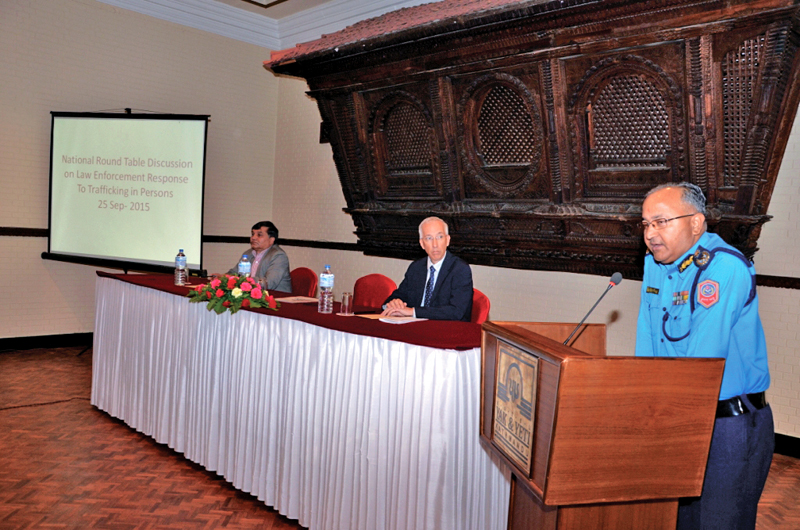Human trafficking spreading far and wide: Police
Kathmandu, September 25
Inspector General of Police Upendra Kant Aryal today said the law enforcement agency is gravely concerned about the transnational dimension of human trafficking.
Addressing the national round-table discussion on ‘Law Enforcement Response to Trafficking in Persons’ organised by the Department of Crime Investigation in association with the US Embassy in Kathmandu, IGP Aryal said, “Once Nepali women and girls trafficked by organised crime syndicates used to end up in the Indian cities of New Delhi and Mumbai. Now it is not limited to the neighbouring countries.
The web of trafficking for worst forms of slavery and sexual exploitation has gradually spread to African and Latin American countries.”
Lack of mutual agreements and extradition treaty with the emerging destination countries has posed a serious challenge to Nepal Police’s efforts to bring home many accused of human trafficking.
“Let alone suspects hiding abroad, we had a hard time bringing home Sanjaya Ismali Magar, who shot Justice Rana Bahadur Bam, from Saudi Arabia. Nepal has not signed extradition treaty with Saudi Arabia,” he said.
IGP Arayal warned that many women and girls were being trafficked out of the country under the cloak of foreign employment, marriage and abroad study. “Bearing this in mind, we have launched a massive crackdown on suspected marriage bureaus, educational consultancies and outsourcing agencies,” he said.
Aryal laid emphasis on creating a post of police attache in possible destination countries to prevent human trafficking and initiate legal action against the guilty. “We have already urged the government through the Ministry of Home Affairs to create a post of police attache abroad, but to no avail,” IGP Aryal lamented.
John L Carwile, charge d’ affaires at the US Embassy, described human trafficking as a global scourge.
“Prevention of the crime, protection and rehabilitation of the victims, prosecution of the perpetrators are what we should have been seeking. It is a transnational crime and no country is immune to it. We should make a concerted effort to put an end to human trafficking,” he highlighted.
Joint Secretary Laxmi Prasad Dhakal, spokesperson for the Ministry of Home Affairs, said human trafficking continues to be a major concern despite concerted efforts of the government and law enforcement agencies to combat the crime. “Human traffickers have been capitalising on the geophysics of the country, lack of employment opportunity, low education level and poverty to lure women and girls into foreign countries with the promise of lucrative job and better future. The victims feel cheated only when they are left to fend for themselves in a foreign country,” he said.
SP Kiran Bajracharya of the Central Investigation Bureau said reported cases of human trafficking
have been increasing over the years. According to her, the CIB dealt with a single case of human trafficking in 2012-2013 against five in 2013-14 and eight in 2014-15. The CIB arrested 41 suspects in connection with human trafficking in the past three years.
“We have registered two cases of human trafficking with the arrest of four suspects so far this fiscal year,” SP Bajracharya informed.






